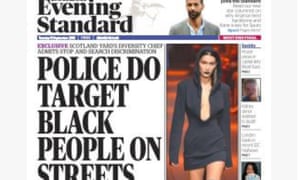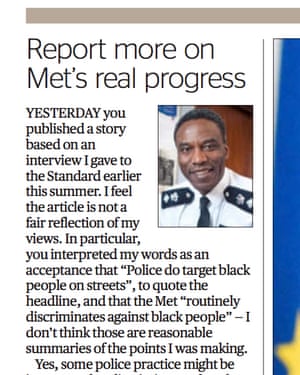
A police chief interviewed by the London Evening Standard complained that the paper’s resulting front page story, published on Tuesday, did not accurately reflect his real views.
Scotland Yard’s new head of diversity, Chief Superintendent Victor Olisa, was particularly upset by the headline, “Police do target black people on streets”.
He was joined in his complaint by four London assembly members who registered their “disappointment” about the article in a letter to the Standard editor signed by the chairman of the police and crime committee, Steve O’Connell.
In their letter they said that Olisa had “expressed his deep concern about the way this story was reported.” It said: “We share his concerns that your article, in particular the headline, does not accurately reflect the comments made in his interview, and could lead some people to misinterpret his views.”
The article, written by the Standard’s crime editor, Justin Davenport, quoted Olisa as saying that police were “routinely discriminating against black people in stop-and-search operations in London as part of a misguided performance culture.”
It was, said Olisa, accepted practice for police officers to stop young black men to try to boost arrest rates for drugs such as cannabis, but officers turned a blind eye to white men who might be carrying cocaine.
The discrimination, according to the article, “was unwitting and driven by performance rather than racism but had led to a negative stereotyping of black people.”

Although the Standard stood behind its interpretation of the interview, and its published article, it reacted to the complaints by offering Olisa a chance to respond on the letters page.
So, on Wednesday, it carried a letter by Olisa in which he contended that the headline and opening sentences of the article were not “reasonable summaries of the points I was making.” He wrote:
“Yes, some police practice might be interpreted as discriminatory but that doesn’t mean officers stop and search people based on prejudice.
Likewise, discrimination may be the unintended outcome from performance measures but that is different from performance driving discrimination.”
He also took issue with the page 2 headline, “I’ve suffered racism at work, says Met chief”. Olisa wrote: “I am concerned that some readers would interpret that as racism from fellow officers. As I made clear in the interview I have not been the subject of racist behaviour from my colleagues but I have from the public.”
He also wrote: “It is a shame you did not publish parts of the interview where I talked about the progress in BME recruitment and the increased number of senior officers from minority communities.”
Will Gore, the Standard’s deputy managing editor, said the paper believed its report “was a fair and accurate reflection of the comments Victor Olisa made during an interview with our crime editor.”
He said: “We made it clear in the article that he did not believe disproportionate targeting of black people by police was the result of racism on the part of individual officers, but rather stemmed from other factors.
“We believe the content that our story, about a matter of significant public interest, was legitimate and accurate.”
Giving Olisa an opportunity to respond was “in line with our usual practice.”